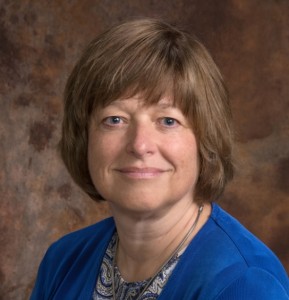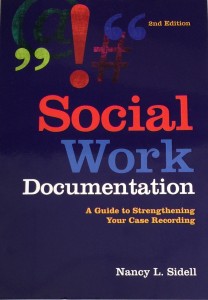Meet the Author: Social Work Documentation Expert Nancy Sidell

Nancy Sidell, PhD
Nancy Sidell knows that documentation isn’t a popular topic. In the second edition of Social Work Documentation: A Guide to Strengthening Your Case Recording (published this month by NASW Press), she describes it as “the bane of many professionals’ existence.” With this in mind, Sidell talked with SocialWorkersSpeak.org about the features of the updated edition, the common recording mistakes new practitioners make, and how she overcame her own writing difficulties.
Q: Why did you decide to pursue social work as a career?
Sidell: Social work has always called to me, I think. My grandmother, who passed when I was 16, was one of the many influences that guided me to the profession. At her funeral, I met a woman that my grandmother had taken in and cared for when she was young. She confided in me that she didn’t know how her life would have ended up without my grandmother’s kindness and encouragement. My grandmother was practicing social work at a time when she had very little resources herself.
Following graduation, my first job was in a nursing home. In many ways, it was a great job. It was a privilege to be involved in the lives of the residents there and I learned so much from their stories. After two years, an opportunity arose at the local community hospital. I still worked with older adults but also began serving other age groups. I later moved to a larger city and was hired at a regional teaching hospital. It was there that I knew I needed to obtain my MSW, which I did in a weekend program designed for working professionals.
In the hospital’s social work program, we accepted several student interns from local universities. We began noticing that one program’s interns weren’t arriving as prepared as they should have been. I contacted the program about our decision to stop accepting their students, and was told they were experiencing staffing issues. They asked if I was interested in teaching a course in their program until they could stabilize. I said no immediately. I was a social worker, not a teacher! However, I decided later that instead of simply pointing out the problem, I wanted to be part of the solution. I committed to teaching a course for one semester and fell in love with it! It took me a few years, but I finally gathered the courage to quit my job and enroll full time in a PhD program. It was a scary decision but the right one! I was a BSW program director for 16 years. This year, I accepted an interim dean position at my university, which has been a wonderful opportunity. I was concerned that I might lose my social work skills but find that I still use them daily. At the moment, I consider myself a social worker who happens to be an administrator.
Q. What inspired you to write Social Work Documentation? What new information have you incorporated into the second edition?
Sidell: When I started visiting social work education programs as an accreditation site visitor for CSWE, I was struck by the inconsistencies in how recording was managed in educational settings. I had developed writing exercises for use in my own teaching over the years and wondered if there was a need to share them with others. I’ve received excellent feedback on the first  edition, and was encouraged to update the book in this second edition.
edition, and was encouraged to update the book in this second edition.
I wrote this book with the hope of guiding others through the world of documentation. Practitioners are expected to arrive in positions with excellent skill sets and equally impressive writing skills, but the latter is often overlooked. Most job interviews don’t require social work applicants to demonstrate their writing abilities; the assumption is made that these skills are naturally present. Unfortunately writing isn’t intuitive for many of us, and approaches to documentation often aren’t formally taught in social work programs. My book builds on that notion in a developmental way. This second edition focuses on ways to assess one’s documentation skill level and systematically build on those skills with relevant exercises.. This edition also provides updates on electronic case recording and trauma-informed documentation, and invites readers to approach documentation by reflecting on their writing strengths and challenges.
Q. In your book, you describe how case recording has evolved since the beginnings of the profession. What do you think is the best way for a new social worker to learn case recording skills?
Sidell: In my opinion, our profession has never been clear about how or where documentation skills should be taught. We’re very clear that assessment skills, for example, should be taught in the classroom and reinforced through experience in field education settings. We don’t depend on agencies to teach students how to assess a client or set goals with them. We don’t say, “Not to worry, you can learn how to assess a client once you’re out in the field.” Teaching assessment is clearly the purview of social work education programs. But when it comes to documentation, the protocol isn’t nearly as clear. We make the assumption that agencies will train social workers in recording skills or assume that students can learn how to document in the field. We teach students how to write research papers and use APA, but those skills often don’t translate into practice settings. As I note in my book:
A social work student may write an acceptable research paper on child abuse but may not be as skillful at writing his or her first case note during field education. Alternately, a social work student may present a thorough process recording in graduate school but have difficulty producing the narrative notes required in an agency setting.
For new social workers to succeed, I believe it is imperative that the development of case recording skills becomes a higher priority in the classroom.
Q. Did you ever struggle with case recording or poor record keeping in your career? Can you give us an example of a specific difficulty and how you overcame it?
Sidell: I was a horrible writer! At my first job in the nursing home, I was only the second social worker ever employed there. Unfortunately, my predecessor wasn’t a skilled writer either. Without strong examples to guide me, I struggled with knowing how much to write. I would often over-document, a common problem for new practitioners. I remember writing a nine-page update on a resident where I included every imaginable detail!
My documentation improved when I moved into hospital social work. The fast-paced environment taught me the necessity of brevity and the importance of and documenting the right details. Hospital social work made me really focus on recording only the most important information. It was largely trial and a whole lot of error! I was fortunate to have excellent mentors helping me along the way.
Q. What common mistakes do new social workers make when approaching case recording for the first time? How will your book help steer them away from those errors?
Sidell: I believe that over-documentation is a major issue for new social workers, as I noted. The other extreme is not recording enough of the appropriate information. I feel that our current culture of texting and tweeting is affecting the skills of new social workers entering the field. Writing skills in general seem to have declined. I’ve seen case recording that includes phrases like, “I will c the client again tomorrow” and “‘The client said ‘r u ready?'” that are a direct result of this decline. Using grammatically incorrect words in formal documents is further evidence of this erosion.
My book provides exercises that will help new social workers identify the right material to record and recognize the importance of appropriate language and format. Learning proper word usage can be tedious, but it is a necessary part of professional development. While there are many general grammar books, all of the examples in my text are social-work related. This unique and practical feature makes learning the right word easier for social work students.
Q. On the whole, do you feel that technology has helped or hindered case recording? What core principles should social workers keep in mind as technology continues to advance?
Sidell: I believe that technology truly has been a mixed blessing for case recording, and we haven’t figured out the best way to manage it yet. As noted in my book:
Technology can be dehumanizing and time consuming to learn and manage. It is unknown if technology frees up social workers’ time and energy, or requires more of it. Issues of confidentiality arise, as do contraindications of its use with certain types of clients…. Breaches in the system, system failure and lack of client privacy of sensitive information are all possibilities with any system. There are numerous opportunities for client privacy to be compromised. Information overload is also possible with too many details available to too many people. Whether or not the benefits of technology use outweigh its drawbacks, it is clearly a force with which to reckon.
Technology CAN improve and simplify the efficiency of social work documentation, but it comes with special challenges. Time, costs, and workload management are all issues that need to be addressed. No matter what, technology is here to stay and continually advancing. It’s going to be our jobs to figure out how best to manage it.
Q. What do you hope readers that will take away from your book?
Sidell: I hope readers will take away that solid case recording is possible and within their reach. Social work documentation is a reflection of their professionalism and a very real way of helping their clients. I hope they can see real improvements in their skill level and have greater confidence in their writing abilities. Finally, I hope they find the exercises fun to complete and useful to their practice!
Q. What advice would you give to those entering social work or related professions?
Sidell: Looking back on my career, I’m struck by how fortunate I’ve been in my choices and in the colleagues from whom I’ve learned so much. My best advice to new social workers is to find co-workers from whom you can learn. Set goals for yourself about what professional skill you’d like to improve on and take the steps necessary to make it happen. It’s so important to learn new skills, including hobbies for self-care purposes (I wholeheartedly agree with fellow NASW Press author SaraKay Smullens that the importance of self-care cannot be overstated). For example, I decided to try my hand at knitting a few years ago. Though my first square dish cloth looked more like the outline of the state of Florida, I haven’t quit yet and I can see that I’m making progress. Learning a new skill informs my teaching too, as it reminds me of what it’s like to be a student. Always keep learning!
Social Work Documentation: A Guide to Strengthening Your Case Recording, 2nd Edition is now available. For more information about publishing with NASW Press, please contact Stella Donovan, Acquisitions Editor, at sdonovan@naswdc.org
Nancy L. Sidell, PhD, is professor of social work at Mansfield University, Mansfield, Pennsylvania. She has served as BSW program director and department chair during her tenure at Mansfield University. She has over 18 years practice experience as a social worker in health, mental health, and nursing home settings. She is an item development consultant with the Association of Social Work Boards and a coauthor (with Denise K. Smiley) of Professional Communication Skills for Social Workers.
| Leave A CommentAdvertisement
Leave a Comment
You must be logged in to post a comment.


